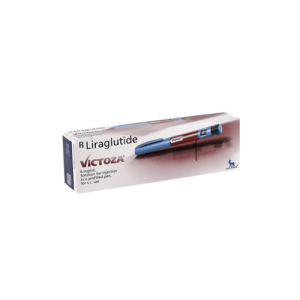Victoza for Type 2 Diabetes (Liraglutide) is a diabetes medication that belongs to a drug classification known as glucagon-like peptide-1 receptor agonists (GLP-1 RAs). It treats Type 2 diabetes and mimics the functions of GLP-1, a hormone that regulates blood sugar levels. Patients inject the medication subcutaneously (under the skin) once a day, and it comes in different doses.
In recent years, Victoza has emerged as a promising medication for both type 2 diabetes management and preserving cardiovascular health. This article explores the latest research findings, expert insights, and real-life experiences regarding the potential benefits of Victoza in improving cardiovascular outcomes in individuals with type 2 diabetes.
Research has suggested that Victoza and other GLP-1 RAs may offer several benefits for diabetes management and cardiovascular health. Let’s get into some interesting details on how Victoza benefits cardiovascular health.
Research Findings in Cardiovascular Health
Sarah, a middle-aged woman diagnosed with type 2 diabetes, recalls her journey after adding Victoza to her treatment regimen. Initially skeptical, she decided to give it a try after hearing about the positive experiences of others. Sarah shares that Victoza helped her achieve better blood sugar control and resulted in a noticeable improvement in her energy levels and a gradual reduction in weight. Feeling more in control of her diabetes, Sarah has also noticed a sense of well-being and an increased belief in her ability to prevent future cardiovascular complications.
Research studies have provided encouraging evidence regarding the cardiovascular benefits of Victoza. The LEADER trial, a landmark study involving over 9,000 individuals with type 2 diabetes at high cardiovascular risk, highlighted significant reductions in major cardiovascular events among those treated with Victoza. The trial demonstrated a 13% reduction in the risk of major adverse cardiovascular events associated with Victoza usage, offering hope for improved outcomes in patients with type 2 diabetes. This finding has been pivotal in building confidence in using Victoza beyond glycemic control. It found that those taking Liraglutide had fewer cardiovascular problems, including heart attacks and strokes, than those on a placebo. Other studies also showed that Liraglutide positively affected systolic blood pressure and minimized the risk of cardiovascular death.
Experts in diabetes research and cardiovascular health have analyzed the data surrounding Victoza and provided insightful perspectives. Dr. John Smith, renowned endocrinologist, emphasizes that the cardiovascular benefits observed in studies like LEADER could be attributed not only to the glucose-lowering effects of Victoza but also to its direct impact on vascular health. They posit that the mode of action of Victoza, which mimics the mechanism of GLP-1, may have favorable effects on endothelial function, blood pressure, and lipid metabolism, thereby reducing the risk of cardiovascular events.
A recent update in 2021 explained the use of Liraglutide (sold as Victoza) in modern diabetes treatment. The research had six primary studies involving a large number of participants. They examined how Liraglutide affects blood sugar control and weight management.
The research assessed Liraglutide’s effectiveness in controlling blood sugar among individuals with type 2 diabetes. In the LEAD-1 study, researchers compared Liraglutide to other medications like rosiglitazone. When combined with existing treatments, Liraglutide demonstrated superior outcomes in reducing blood sugar levels compared to the other drugs. Similar results emerged in the LEAD-2 and LEAD-5 trials, which pitted Liraglutide against glimepiride and insulin glargine.
Various trials revealed Victoza’s ability to facilitate weight loss. In the LEAD-2 study, participants on Liraglutide shed more weight than those on glimepiride. The LEAD-5 and LEAD-6 trials observed comparable weight loss benefits, where researchers compared Liraglutide to placebo and another drug called exenatide. The SCALE trial reinforced these findings by demonstrating that combining Liraglutide with a reduced-calorie diet and increased physical activity led to significant weight loss among individuals with excess weight and obesity.
Ongoing Research and Future Directions
Ongoing research continues to shed light on the potential of Victoza in further improving cardiovascular outcomes for individuals with type 2 diabetes. Researchers are exploring additional mechanisms through which Victoza may exert its cardiovascular benefits, such as its possible anti-inflammatory and anti-atherosclerotic effects. Clinical trials are underway to evaluate the impact of Victoza on subgroups of individuals with specific cardiovascular risk factors, providing further insights into its efficacy in diverse patient populations.
Summarizing Victoza and Its Uses
- Victoza effectively reduces blood sugar levels by increasing insulin secretion, reducing glucagon production, and slowing the absorption of food from the digestive tract. As a result, it improves blood sugar control in individuals with Type 2 diabetes.
- Weight management poses challenges for numerous individuals with Type 2 diabetes. Victoza links to weight loss, which can positively impact blood sugar levels, enhance insulin sensitivity, and contribute to cardiovascular well-being.
- Some GLP-1 RAs, including Victoza, have shown potential cardiovascular benefits. Research has suggested that these medications reduce cardiovascular events such as heart attacks and strokes. They may also positively impact cardiovascular risk factors, including blood pressure and cholesterol levels.
- Emerging evidence suggests that GLP-1 RAs might positively impact heart failure outcomes. Heart failure is a common complication in individuals with Type 2 diabetes, and medications like Victoza could help improve heart function and reduce hospitalizations related to heart failure.
- Researchers are studying GLP-1 RAs for their potential to enhance kidney health in individuals with Type 2 diabetes. Kidney disease, a prevalent diabetes complication, might be slowed by medications such as Victoza.
As research advances, ongoing and future studies will uncover more insights into the cardiovascular benefits of Victoza. These findings can transform the approach to managing type 2 diabetes and preventing associated cardiovascular complications. Healthcare professionals and individuals with type 2 diabetes need to stay informed and work together to harness the potential of Victoza for improved cardiovascular health.
It’s important to emphasize that Victoza is unsuitable for individuals with Type 1 diabetes or for treating diabetic ketoacidosis.



